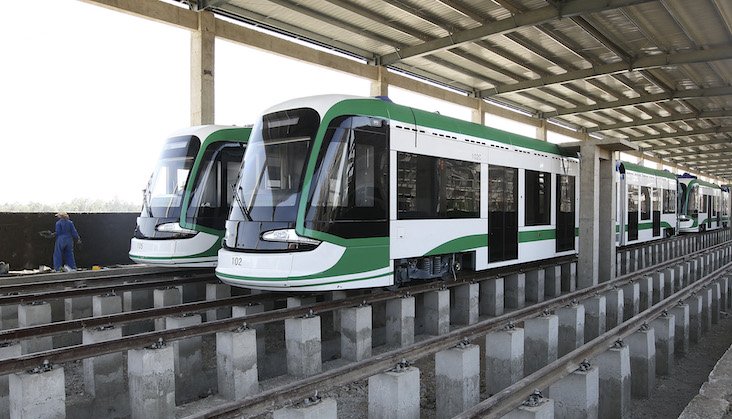
This originally appeared on TheAfricaReport.com
The light railway system in Addis Ababa provides a direct view into the successful and tangible economic diplomacy of China across the African continent. This example of mass public transport is unique in sub-Saharan Africa, with the train and extensive track providing a manifestation of development and growth in this populous East African country.
Construction on the railway commenced in December 2011 with China’s Export-Import Bank providing 85% of the funding for the project. The China Railway Group Limited took three years to complete the 34.4km, two-line system. The lines have been fully operational since November 2015. The system, however, carries fewer than 200,000 passengers daily in a city of nearly seven million people, suggesting that the railway has not had the dramatic impact expected by some supporters.
China’s conspicuous role
For all of its investment in the development of some of Africa’s youngest economies, China is increasingly becoming associated with some debt burdens. At the start of 2019, analysts estimated Ethiopia had borrowed more than $12bn from China. The Asian powerhouse faced some international outcry for the outstanding amount sitting on the Ethiopian balance sheet. On the one hand, China’s decision earlier this year to cancel all interest-free loans advanced to Ethiopia demonstrates the power of protest and international oversight (in conjunction with Ethiopia’s growing international might), while on the other hand it gives direct insight into the burgeoning presence of China in Africa and on sovereign balance sheets.
If only Kenya and Tanzania could be so lucky as to receive similar debt forgiveness. Both countries need to see some Chinese debt come off their balance sheets. Kenya borrowed more than $9.5bn between 2006 and 2017, which makes it the third-largest recipient of Chinese loans in Africa. It is this reality of Chinese support that led Kenya’s President Uhuru Kenyatta to request additional support from China to fund the next phase of Kenya’s ambitious $10bn railway. China has already provided $4.7bn to finance the near-500km track between the port of Mombasa and Nairobi, and President Kenyatta not surprisingly assumed China would dole out the remaining $3.5bn necessary for the final section of the railway to Kisumu on Lake Victoria. But China sent the Kenyan president away with relatively empty hands.
Africa is not America (obviously)
To listen to some Africans, coming away partially empty-handed may not be so bad. It was only a partial failure because President Kenyatta received funds for a data centre and a road to connect Nairobi’s suburbs to the airport. The growing fear is that Chinese money is financing the next cycle of African debt problems, following some years of debt forgiveness to African countries by rich countries. Critics are quick to suggest that China will seize assets when sovereign entities default, often referencing the Chinese-financed port at Hambantota in Sri Lanka. The port failed commercially, then a Chinese state-owned firm took control. China’s defenders could argue that the world’s second-biggest economy is a major lender to the United States too and is not seizing assets there.
China’s defenders will argue that the world’s second-biggest economy is a major lender to the United States too, and is not seizing assets there.
The comparison – or lack of comparison – between China’s significant creditor position with Africa and with the US provides insight into the different dynamics of negotiation for African countries and the US. Speculation late last year that China would take over the Zambian state power utility company for unpaid debt between $6bn and $10bn only died after consistent pushback on such a narrative by the Zambian government, particularly against the US, who Zambia blamed for the rumour. To put things into perspective, that $10bn debt is minuscule when compared to the more than $1.1trn owed to China by the US. Yet there is little speculation on China seizing assets or any rumour of China creating America’s debt trap.
There are several reasons for the difference in China’s approach to African nations and the US. First, US treasury bonds are not exactly loans or like the debt provided to many African nations. Any country or major hedge fund (for the sake of discussion) could become a major creditor to the US by buying up treasury bonds. However, attempting to seize control of the US assets because of a potential treasury default (if it happens) would require a monstrosity of legal costs and complexity that no one truly wants to endure.
Secondly, the US is a rich country with a long-standing and growing economy. The US could offer high interest rates and find an oversupply of happy buyers. Third, and most importantly, the US wields as much economic power as its creditors. The appetite for US debt, in many instances, finds a boost if Chinese bonds are not as stable, which only underlines the US global reputation as the safe landing for any scared or worried investors in other markets. Moreover, economic power for the US remains omnipresent, as its major urban centres buoy its reputation as a global financial and business hub. President Donald Trump accordingly can wage a (successful?) trade war when he thinks China is manipulating its currency and unfairly tilting trade balances in its favour.
President Trump has, at the very least, shown that America can challenge any economic outcome it deems unfair. This is not the case for many African nations.
The reality of the African experience is not one of a global financial hub. These young economies have some truly bullish markets, albeit built on cash transactions – and subsequently a low tax base – and a very believable growth story. The upside in these countries is long term but not exactly visible today, and consequently not tradable in today’s economy. The counter may be that the US is trading and bargaining on its history and historical performance with its long-term growth numbers generally slower than previous decades. That said, the US economic story is a strong commodity, which its political apparatuses do a great job to reinforce and protect. President Trump has, at the very least, shown that the US can create havoc on any economic system or challenge any economic outcome it deems unfair. This is not the case for many African countries.
Consider that the US is a member of the African Development Bank because it pays its financial contribution, similar to African member countries. Until African states wield similar economic and political power, their point of leverage with China will remain weaker than the US’s in negotiations. China, sadly, knows this reality and will continue to rely on it until a few countries in Africa truly wield power in more global economic and political arenas beyond the African continent itself. Considering the debt forgiveness from China, Ethiopia could, with an increasing global power network (via its relationships with other countries), be the first country to find its way to a stronger bargaining position.
Or, as some critics suggest, Ethiopia may simply be playing China against America better than most countries and, accordingly, altering the African debt narrative. Pitting powers against each other, in particular the US and China, can easily boost your importance and potentially create greater financial reward… that is power 101… though this is easier said than done.
